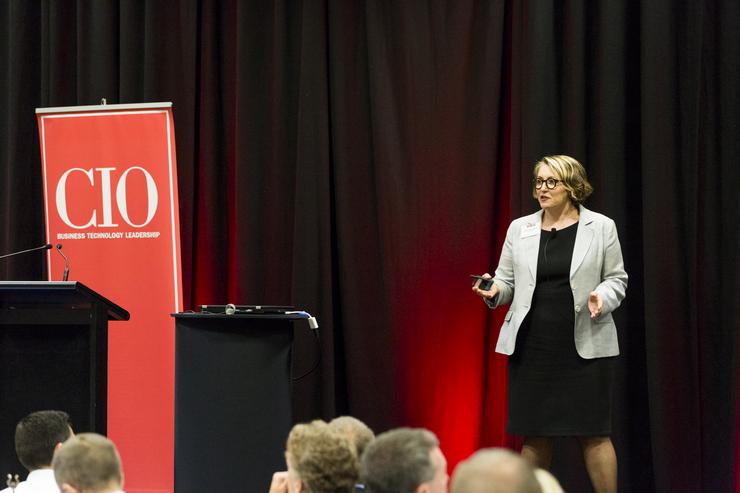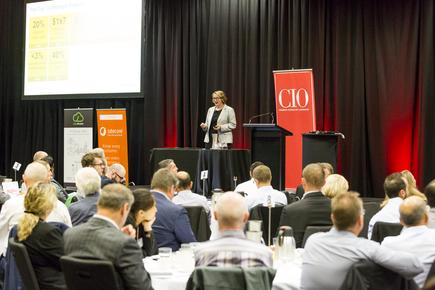
Jenny Beresford of Gartner talks about 'surviving the storms of digital disruption' (Photo by Jason Creaghan)
Within three years, the average person will have more conversations with bots than with their spouse.
“You may be sick of hearing the word disruption, disruption, disruption,” says Jennifer Beresford, research director at Gartner.
“But it is not going to stop, it is going to continue,” as the digital experience and user engagement remains on a sharp growth curve.
“We are already being drawn into ongoing nonstop virtual interactions,” says Beresford, who was a keynote speaker at the CIO100 breakfast forums last week in Auckland and Wellington.
Even if you do not use your smartphone you will be tracked as you move around the city, for instance with public transport, and as you do your financial transactions, she states.
With the sharp and ongoing shift to digital, data management is very critical.
“You think you are reading the internet, but the internet is reading you,” she says. “That is the power of data. So what do you do with the data?”
Who made it to the 2017 CIO100?

The CIO as futurist
When a tornado approaches, it is like a pencil on the horizon Beresford says.
Disruption a decade ago was a bit like that, she says. “You could see the disruption, you could track it and you could stand back a little.”
Today, digital disruption is more like a typhoon, she says. “They cover large areas over time.”
Thus, she says, future disruption should be measured by intensity and from there, the organisation can take three steps: Recognise, prioritise, respond.
“A CIO needs to be a futurist these days, you have to be strategic and to be thinking constantly,” says Beresford.
Predictions about the future, she says, are increasingly becoming predictions about what disrupts lives.
She says innovation will continue to create extraordinary change from mundane concepts.
For instance, Facebook was started as a way to catch up with people across a US college campus and now connects two billion people across the globe.
She says another thing to consider, is that the secondary effects will be more disruptive than the initial change.
In the case of driverless cars, the secondary effects will be like ripples in a pond. How will a technical advance of not having a steering wheel affect insurance, urban planning and the judicial system after accidents?
Beresford shared the top predictions on disruptors Gartner expects to impact businesses.
By 2020, she says,100 million consumers will shop in augmented reality.
Pokemon Go was just the beginning of the overlay of the digital on the physical, she says.
Organisations can respond by deploying AR for shopping and she says one in five leading global retail brands will deploy the technology this year.
For instance, L’Oreal lets customers put on makeup using AR so they can see how it would look before purchasing, while some clothing retailers use the technology for customers to try on clothes when online.
Explore where AR might be useful to you in the workplace, she says.
‘Voice first’ phenomena
By 2020, a third of web browsing sessions will be done without a screen, says Beresford.
‘Voice first’ interactions are here and she believes organisations need to build conversational UX, such as bot interactions and machine learning, for industry use.
With voice activated interactions you don’t need a screen and keyboard, you will need an internet connection, she says.
This year, 5 per cent of consumer-facing websites feature audio interfaces or voice-enabled ‘chatbots’.
‘Bots’ will be a significant part of our reality, she says. “Within three years, the average person will have more conversations with bots than with their spouse.”
"Think how to develop bots so you can more quickly respond and interact with consumers and stakeholders."

Forgotten apps
Prepare too for the demise of mobile apps, she says.
Digital strategy is not about developing more apps or a better website, she states.
Digital is a lot about connectivity and the way to unlock data to change people’s behaviours. It is not about apps,
“If you think it is about apps, you are too late,” she states.
She expects 20 per cent of brands will abandon their mobile apps by 2019.
Apps, on average, are not great investments she says, with the number of branded applications showing declining usage growth over the past year.
Apps are not automatically a brand enhancer, she says. If you have an app that someone does not use, that can have a psychological effect.
Most people use between five and 10 apps. The ones that are not used go to a “big dark basement” on your device and if the app is unused, it can diminish your brand, she states.
Give serious consideration whether you may be able to move towards voice interactions, she says.
Businesses can respond by building new progressive web apps and instant apps.
Beresford says in three years, algorithms will positively alter the behaviour of more than one billion workers. Enterprises will need to to catalogue, broker, share and protect these algorithms.
“Protect your algorithms - share them with your partners - but don't just give them away,” she says.

Build your blockchain roadmap. Blockchain applications are immature but, like so much in IT, not for long.
A roadmap for blockchain
Build your blockchain roadmap, she advises.
"Blockchain applications are immature but, like so much in IT, not for long," she says.
Blockchain will cut costs through transactions,she says. She predicts by 2022, a blockchain-based business will be worth $10 billion.
Thus organisations should prioritise ledger experiments, blockchain ledgers and smart contracts.
Beresford says organisations can not transform without modernising their IT environment.
If you are moving to bimodal or two-speed IT, you need to shore up your legacy environment and modernise your core so you can free what is inside, she says.
“It is all about data. If data is locked away in five CRM systems, you are not going to be able to do much.”
Next year, she predicts IT service providers will increase revenue from modernisation work by 30 per cent.
Beresford cites the importance of working on a strategy on how to deal with digital giants.
She says by 2021, 20 per cent of all activities in which an individual engages will involve at least one of the top seven digital giants.
Read more: Time to shift to platform thinking
These are (as of today) Google, Apple, Facebook, Amazon, Baidu, Alibaba and Tencent.
Jack Ma, founder and CEO of Alibaba, sees himself as a chief educational officer for his organisation, says Beresford.
He is constantly encouraging innovation and creativity, she says. He is successful because he is constantly assessing what is impossible, then trying out what is possible.

“You have to join them or compete with them,” she says of these digital giants. “If you are going to compete with them, you have to be damn good.”
“Do some user cases, keep experimenting and keep trying."
“Think like a digital giant,” she advises.
"Your mantra for the 21st century should be: 'Make it digital, make it programmable, make it smart.'”


Send news tips and comments to divina_paredes@idg.co.nz
Follow Divina Paredes on Twitter: @divinap
Sign up for CIO newsletters for regular updates on CIO news, views and events.
Join the CIO New Zealand group on LinkedIn. The group is open to CIOs, IT Directors, COOs, CTOs and senior IT managers.



